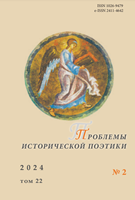Петр Верховенский в системе героев романа Ф. М. Достоевского «Бесы»
Pyotr Verkhovensky in the Character System in F. M. Dostoevsky’s Novel “Demons”
Author(s): Vasily A. KhotakkoSubject(s): Russian Literature, Theory of Literature, Sociology of Religion, Sociology of Literature
Published by: Петрозаводский государственный университет
Keywords: F. M. Dostoevsky; Demons; Verkhovensky; cultural unconscious; Law and Grace; great time; spiritual experience;
Summary/Abstract: The purpose of the article is to reveal the artistic and philosophical significance of the image of Pyotr Verkhovensky, who is the main character in the novel “Demons” by F. M. Dostoevsky. This implies an expansion and deepening of ideas about his personal development. In Verkhovensky’s spiritual experience, concepts about the primordial Christian landmarks are misperceived and the hierarchy of Law and Grace is violated. Pyotr Verkhovensky is endowed with the ability to influence others for the sake of his own selfish motives in the name of self-affirmation, building an imaginary reality, and commanding his trusted associates with threats and blackmail. Legalism imperceptibly turns into lawlessness, on the one hand, endowing Verkhovensky with the power to influence others, clearly by nature or by perverted human nature. On the other hand, it condemns the hero, who succumbs to the temptations of self-affirmation, to loneliness and spiritual impoverishment. The article also shows the influence of Pyotr Verkhovensky on the creative explorations of Russian writers, revealing the tragic consequences of violating the value hierarchy of Law and Grace, which allows us to consider this artistic image in the moral paradigms of modernity.
Journal: Проблемы исторической поэтики
- Issue Year: 22/2024
- Issue No: 2
- Page Range: 135-152
- Page Count: 18
- Language: Russian

